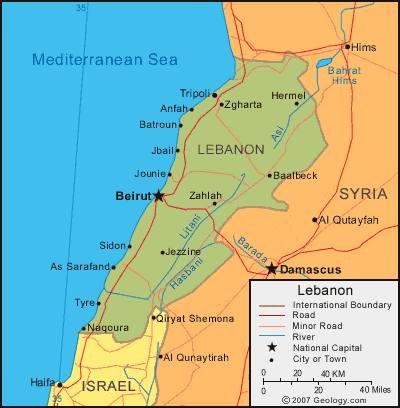
After 20 years of Media Lens, it seems only natural that we should look back in gratitude at the support we’ve received. In response to one of our early pieces, a kindly columnist at the Observer commented:
‘Dear David,
‘Thank you very much for sending me a copy of your piece, which strikes me as spot on.
‘Yrs,
‘Nick Cohen’
A Guardian columnist responded with even more effusive praise:
‘This article is brilliant and fascinating David, as ever.’ (George Monbiot)
Alas, our ethical integrity declined precipitously after we subjected our interlocutors to criticism, with Cohen addressing us as ‘Dear Serviles’, signing off with ‘Viva Joe Stalin’ (Cohen, email, 15 March 2002). Monbiot went on to write an article titled, ‘Media Cleanse’. He described our organisation as ‘an apologist for genocidaires and ethnic cleansers’ – Guardianspeak for ‘critics who embarrass apologists for Western foreign policy’. Both Cohen and Monbiot have long since blocked us on Twitter.
More seriously, beyond the corporate fringepuddle, we were initially astonished by the level of public support we received. A reader commented early on:
‘Dear MediaLens, I feel like crying with the gratitude I feel to you people for the immense amount of work that must go into writing incredibly detailed, researched synopses like that we have just received from you on Iraq.’
Last month, a reader emailed:
‘My sister and I have followed your work for many years and really I don’t have the words to describe the value of the service you provide to a global community.’
We once asked Harold Pinter what he thought of the media claim that ‘people are completely indifferent to everything that’s going on and couldn’t care less’. In his inimitable style, Pinter replied:
‘That is actually bollocks.’
We sometimes feel genuinely embarrassed by the praise we receive because it has always seemed to us that we are involved in a kind of turkey shoot.
The fact is that, like other corporate employees, on pain of career cancellation, media workers simply cannot expose truths that discomfit their owners, parent companies, editors, advertisers, colleagues, and allied powerful interests. It is child’s play to demonstrate that this is the case.
Even as we were editing this alert, Jack Slater, an ostensibly impartial, objective senior BBC broadcast journalist covering Joe Biden’s first visit to the UK as president, tweeted:
‘Always special to film POTUS [President of the United States].’
Nobody noticed. If Slater tweeted, ‘Always special to film Assad’, or, ‘Always special to film Putin’, he would be guilty of ‘bias’ contravening the BBC charter and out of a job. Likewise, if he tweeted, ‘Always uncomfortable to film the head of US imperial power.’
Because journalists are also not free to discuss what it is they are not free to discuss, we often have the last word (Slater, of course, ignored our tweet, above). This also makes us look great!
The point is that we don’t have direct bosses – owners, managers, editors, parent companies. And we also don’t have indirect bosses – advertisers, wealthy philanthropists, supportive charitable foundations, organisational allegiances, and so on. This is the one advantage of being a tinpot outfit run on a shoestring.
The Chinese mystic Chuang Tzu once said: ‘Easy is right.’ Media criticism is easy if you’re willing to burn your media bridges at both ends. We have found that it often produces a lovely light.
Below, we discuss 20 corporate media horrors from the last 20 years that have remained stuck in our minds and craws, and that are ‘actually bollocks’.
1. The 30mm M230 Chain-Driven Autocannon ‘Stitching The Fabric Of A Nation Together’
It couldn’t have been more perfect. On 17 November 2010, BBC News at Ten presenter George Alagiah spoke from the British base, Camp Bastion, in Afghanistan:
‘I’ve been here a week now and it’s been long enough to see some of the small but real steps of progress. But it’s also clear how much further there is to go. And it’s not just about women’s rights or more clinics and schools. It’s about stitching the fabric of a nation together.’
Future historians will write learned dissertations on how gender rights in our time have been commandeered and weaponised by a fathomless cultural arrogance (the polite term) in the service of imperial violence.
For these fine words were spoken in front of an Apache attack helicopter. The gunship’s 30mm, M230 chain-driven autocannon, fresh from ‘stitching the fabric of a nation together’, was clearly visible. This was the same weapon type seen blowing apart a dozen or more Iraqi civilians, including two Reuters journalists, in the 2007 WikiLeaks ‘Collateral Murder’ video. And this is the same aircraft type in which (then) Prince Harry had flown as co-pilot and gunner. Now an ardent anti-racism campaigner, when asked if he had killed people as part of the illegal, racist war on brown-skinned Afghans, Harry answered:
‘Yeah, so, lots of people have… If there’s people trying to do bad stuff to our guys, then we’ll take them out of the game, I suppose.’
Talk of a majority white alliance ‘taking out’ brown-skinned people from ‘the game’ (‘The Great Game’?) would perhaps fail Harry’s own refurbished standards of political correctness now.
2. The Independent on Sunday – ‘Travel Neroists’
Like everyone else, the billionaire-owned, profit-maximising, ad-dependent corporation calling itself the Independent on Sunday now claims to hold a bright candle for the radical climate action required to address the devastation wrought by… (wait for it!)… the billionaire-owned, profit-maximising, ad-dependent corporate system.
In 2016, environment editor Geoffrey Lean lavished praise on himself and his employer:
‘this has been a newspaper that has long been black and white and green all over, winning many awards’.
As Noam Chomsky said:
‘Heaven must be full to overflowing, if the masters of self-adulation are to be taken at their word.’
In 2007 – fully 20 years after scientists had blown a loud whistle on the looming threat of climate collapse – the February 4 cover story of the Independent on Sunday’s Review supplement was almost beyond belief. The words on the cover:
‘Time is running out… Ski resorts are melting… Paradise islands are vanishing… So what are you waiting for?’
Did they mean: what are we waiting for before taking radical action? No, this, after all, was a corporate newspaper and business is business:
‘30 places you need to visit while you still can – A 64-page Travel Special…’
From the depths of depraved corporate cynicism, Marcus Fairs wrote:
‘I am changing my travel plans this year. Alarmed by global warming, shocked by the imminent mass extinction of species and distraught at the environmental damage wreaked by mass tourism, I have decided to act before it is too late. Yes, carbon-neutral travel can wait. I’m off to see polar bears, tigers and low-lying Pacific atolls while they’re still there… In the spirit of Nero – the Roman emperor who sang to the beauty of the flames while Rome burned to the ground – we are determined to enjoy the final days of our beautiful Earth. We are aware that mass tourism damages the very things we are going to see, but this only increases our urgency. We are aware that we will soon have to act more sustainably, which gives us all the more reason to be irresponsible while we still can.
‘Not for us the angsty despair of the eco-worriers, nor the stay-home moralising of the greenhouse gasbags. For we are the travel Neroists, and we have spotted a window of opportunity.’
Fourteen years later, everything has changed, of course. Well, profit-maximising corporate media now at least pretend they care. In April, Greta Thunberg accurately summed up the reality of these heroic businesses that are ‘black and white and green all over’:
‘The climate crisis doesn’t exist in the public debate today. And since it doesn’t really exist… the general level of awareness is so absurdly low…’
For the corporate system, radical change means finding radical new deceptions to allow them to continue maximising profits at any cost.
3. Simon Kelner – Corbyn’s ‘Threatening’ Pronunciation
By the time Jeremy Corbyn stood for the leadership of the Labour Party in May 2015, he had been a Labour MP for 32 years. As a leading anti-war voice, he had received plenty of attention and abuse from corporate politics and media.
We searched the ProQuest media database for national UK newspaper articles containing mentions of ‘Corbyn’ and ‘anti-semitism’ before 1 May 2015. The search found 18 articles, none of which accused Corbyn of anti-semitism. Then, in November 2019, the month before the last general election, we searched for mentions of ‘Corbyn’ and ‘anti-semitism’ after 1 May 2015. We got 15,857 hits. The figure currently stands at 21,919.
This represents a truly awesome, in fact, unprecedented, propaganda assault on a democratic politician. In fact, it closely resembles the campaigns used to demonise leaders of Official Enemy states like Iraq, Iran, Libya and Venezuela, conducted by many of the same journalists in the same media organisations. That’s a gentle way of saying the anti-Corbyn propaganda blitz was a serious attack on democracy, a kind of fascism.
As one would expect during a McCarthyite-style frenzy of this kind, in finding a herd to follow many corporate media workers lost their minds.
A small but telling example was provided in the i newspaper by former Independent editor Simon Kelner, who focused on the way Corbyn had ‘mispronounced’ the name of the sex criminal Jeffrey Epstein. Kelner noted of Corbyn’s contribution to a TV debate: ‘He called him “Ep–Schtine.”’
In attacking Corbyn, along with other journalists like ITV political editor Robert Peston, Kelner did not merely dispense with the usual affectation of journalistic objectivity, he emphasised his subjectivity:
‘My reaction was a visceral one: it’s not something I can explain easily, or even rationally, but a Jewish person does know when there is something that sounds wrong, or perjorative [sic], or even threatening. It was as if he was saying: “Are you aware this man is Jewish?”’
The idea, then, was that Corbyn – who had been subjected to relentless, highly damaging attacks of this kind for several years, and who had done everything he could to distance himself from anti-semitism, taking a very tough line on the suspension of allies like Ken Livingstone and Chris Williamson from the Labour Party – was emphasising Epstein’s Jewishness in a deliberate – or, worse – unconscious effort to smear Jews.
Of course, only a crazed racist would be unable to resist such a patently self-destructive impulse on national TV. And yet, as discussed, Corbyn managed to prevent journalists and politicians from observing his right arm shooting skywards for 32 years. In November 2019, the outgoing Speaker of the House of Commons, former Conservative MP, John Bercow, who is Jewish, said in an interview:
‘I myself have never experienced anti-semitism from a member of the Labour Party, point one. And point two, though there is a big issue and it has to be addressed, I do not myself believe Jeremy Corbyn is anti-semitic.
‘I’ve known him for the 22 years I’ve been in Parliament. Even, actually, when I was a right-winger we got on pretty well… I’ve never detected so much as a whiff of anti-semitism [from him].’
Our search of the ProQuest media database found no mention of Bercow’s comments in any UK national newspaper. Kelner’s comments belong with the most crazed and paranoid effusions of US McCarthyism, where beds were widely believed to be the preferred hiding place for ‘reds’.
4. The BBC’s Missing History Of Iran
The BBC has a long, inglorious history of shortening its historical attention span to suit powerful interests. A key establishment embarrassment was the US-UK’s coup to overthrow the democratically elected Musaddiq government of Iran in 1953.
It truly is embarrassing that the CIA supplied the weapons and money, that the BBC helped green-light the coup, and above all the fact that the goal was oil.
In 1952, the British ambassador commented that ‘Persian [Iranian] public opinion is unanimous in rejecting the [British] offer’ of a deal on oil. But Britain did ‘not consider that a deal on acceptable terms can ever be made with’ Musaddiq.
Colonel Wheeler, an adviser at the British embassy, explained that ‘combined Anglo-American action could, of course, have removed [Musaddiq] at any time during the past six months… Given a united Anglo-American front, a change of government could almost certainly be effected without difficulty or disturbance’. (p. 91)
This neatly captures the traditional US-UK ‘respect’ for democracy and human rights (see point 17 in Part 2).
In a memorandum in August 1952 discussing this ‘change of government’, Sam Falle, a UK embassy official in Iran, suggested that:
‘We should leave the name-suggesting to the Americans… It should not be difficult to bring the American’s candidate… to power.’ (p. 92)
The British preference was ‘for a non-communist coup d’etat preferably in the name of the Shah. This would mean an authoritarian regime,’ the embassy in Teheran noted ominously. (p. 91)
According to then CIA agent Richard Cottam, ‘…that mob that came into north Teheran and was decisive in the overthrow was a mercenary mob. It had no ideology. That mob was paid for by American dollars and the amount of money that was used has to have been very large’. (p. 93)
A US general later testified that ‘the guns they had in their hands, the trucks they rode in, the armoured cars that they drove through the streets, and the radio communications that permitted their control, were all furnished through the [US] military defence assistance program’. (p. 93)
Of this period of history, a recent BBC report observed merely:
‘The UK owes the money for failing to deliver tanks Iran bought in the 1970s.’
Between 1971 and 1976, the UK sold the Shah 1,500 state-of-the-art Chieftain main battle tanks and 250 repair vehicles costing £650 million. Thatcher praised the Shah as ‘one of the world’s most far-sighted statesmen, whose experience is unrivaled’. She added:
‘No other world leader has given his country more dynamic leadership. He is leading Iran through a twentieth century renaissance.’
Curiously, the BBC made no mention of the fact that the tanks had been sent to prop up a dictator installed by the US-UK alliance to steal Iranian oil.
Amnesty International reported of Iran under the Shah that it had the ‘highest rate of death penalties in the world, no valid system of civilian courts and a history of torture’ which was ‘beyond belief’. It was a society in which ‘the entire population was subjected to a constant, all-pervasive terror’.
None of this exists for BBC media workers.
US Iran specialist Eric Hoogland commented of the Shah:
‘The more dictatorial his regime became, the closer the US-Iran relationship became.’
5. Iranian ‘Showdown’ – The Guardian’s Front-Page Farce
In 2007, a front-page Guardian piece by Simon Tisdall claimed that Iran had secret plans to do nothing less than wage war on, and defeat, American forces in Iraq by August of that year.
Iran, it seemed, was ‘forging ties with al-Qaida elements and Sunni Arab militias in Iraq in preparation for a summer showdown with coalition forces intended to tip a wavering US Congress into voting for full military withdrawal’.
The claim was based almost entirely on unsupported assertions made by anonymous US officials. Indeed 22 of the 23 paragraphs in the story relayed official US claims: over 95 per cent of the story. The compilation below indicates the levels of balance and objectivity:
‘US officials say’; ‘a senior US official in Baghdad warned’; ‘The official said’; ‘the official said’; ‘the official said’; ‘US officials now say’; ‘the senior official in Baghdad said’ ‘he [the senior official in Baghdad] added’; ‘the official said’; ‘the official said’; ‘he [the official] indicated’; ‘he [the official] cited’; ‘a senior administration official in Washington said’; ‘The administration official also claimed; ‘he [the administration official] said’; ‘US officials say’; ‘the senior official in Baghdad said’; ‘he [the senior official in Baghdad] said’; ‘the senior administration official said’; ‘he [the senior administration official] said’; ‘the official claimed’; ‘he [the official] said’; ‘Gen Petraeus’s report to the White House and Congress’; ‘a former Bush administration official said’; ‘A senior adviser to Gen Petraeus reported’; ‘the adviser admitted’.
No less than 26 references to official pronouncements formed the basis for a Guardian story presented with no scrutiny, no balance, no counter-evidence – nothing. Remove the verbiage described above and a Guardian front page news report becomes a straight Pentagon press release.
6. The Observer’s Missing War On Syria
The Iraq war catastrophe was a genuine wake-up call for Western governments and media. Something had to change. In retrospect, the answer was obvious: if wars destroying whole countries for oil and other resources were damaging the credibility of Western ‘democracies’, why not just pretend that the West isn’t involved? Thus, Western responsibility for the destruction of Libya barely exists for Western media. Thus, also, this Observer editorial on Syrian president Assad:
‘Many other factors have kept his regime in power. One is the refusal of the western powers to forcibly intervene… Fearful of another disaster like Iraq, MPs rejected UK military intervention. Days later, Barack Obama and the US Congress followed suit. The then Labour leader, Ed Miliband, said the Commons had spoken “for the people of Britain”. Perhaps.’ (Our emphasis)
In reality, the West, directly and via regional allies, has played a massive role in the violence. The New York Times reported that the US had been embroiled in a dirty war in Syria that constituted ‘one of the costliest covert action programs in the history of the C.I.A’, running to ‘more than $1 billion over the life of the program’. The aim was to support a vast ‘rebel’ army created and armed by the US, Saudi Arabia, Qatar and Turkey to overthrow the Syrian government.
In 2013, it was reported that the US had supplied no less than 15,000 high-tech, anti-tank missiles to ‘rebels’ via Saudi Arabia.
In 2014, Joe Biden said of Syria that US allies ‘poured hundreds of millions of dollars and tens… thousands of tons of weapons into anyone who would fight against Assad. Except that the people who were being supplied were… Al-Qaeda and the extremist elements of jihadis’.
7. Warmonger David Aaronovitch’s Regretful Musings On The Inherent Tragedy of Life
Responding to the latest ‘conflict’ (some have gone so far as to call it ‘a war’) between souped-up Palestinian fireworks and US-supplied, state-of-the-art, high-tech ordnance, Times columnist and chateau general commanding the corporate media’s 101st Chairborne Division, David Aaronovitch, sighed wistfully on May 12, 2021:
‘It’s not the Hamas leadership or the Netanyahus who are dying. It’s the people who always die.’
If that sounded empathetic and balanced, it was, in fact, a perfect illustration of a point made by Herman and Chomsky 33 years ago on how ‘worthy’ victims – people Western journalists care about – and ‘unworthy victims’ are treated. In their book, Manufacturing Consent, they wrote of one paired example:
‘While the coverage of the worthy victim was generous with gory details and quoted expressions of outrage and demands for justice, the coverage of the unworthy victims was low-keyed, designed to keep the lid on emotions and evoking regretful and philosophical generalities on the omnipresence of violence and the inherent tragedy of human life.’
It could hardly be more noticeable that when Israel blitzes Gaza every few years, Aaronovitch’s Twitter account does not erupt – he has little to say, finding other things to tweet about. There’s no outrage, no demands for action and ‘intervention’. The same is true of many of the corporate fringepuddle’s habitual warmongers.
By contrast, in Aaronovitch’s support for NATO’s war on Serbia, allegedly in defence of the people of Kosovo, ‘expressions of outrage and demands for justice’ were to the fore. He famously wrote:
‘Is this cause, the cause of the Kosovar Albanians, a cause that is worth suffering for? … Would I fight, or (more realistically) would I countenance the possibility that members of my family might die?’
His answer: ‘I think so.’
But, hold on, ‘It’s the people who always die’, right?
In supporting war on Iraq in January 2003, Aaronovitch wrote of Saddam Hussein:
‘I want him out, for the sake of the region (and therefore, eventually, for our sakes), but most particularly for the sake of the Iraqi people who cannot lift this yoke on their own.’
But isn’t it the people who always die, not the leaders? (Actually, of course, Official Enemies generally do die – they are lynched, buggered with knives, shot in the head, hanged, found dead in jail, buried alive in jail, and so on) So why not let the UN weapons inspectors continue to find nothing?
You can see our book, Propaganda Blitz, (pp. 129-131), for further details of how Aaronovitch generally dispenses with wistful philosophising in supporting wars against Official Enemies.
8. ‘Advertisements For Myself’ – Mehdi Hasan Hawking Left Criticism Of The Left
Mehdi Hasan of the New Statesman, The Intercept and al-Jazeera, is a prime example of a self-identified ‘leftist’ who fiercely attacks left positions on key issues. For example, Hasan wrote in the New Statesman in 2011:
‘The innocent people of Benghazi deserve protection from Gaddafi’s murderous wrath.’
In fact, the ‘threat’ of a massacre in Benghazi was an Iraqi WMD-style propaganda fiction.
Later, Hasan wrote an impassioned open letter addressed to ‘those of you on the anti-war far left who have a soft spot for the dictator in Damascus: Have you lost your minds? Or have you no shame?’
In fact, dissidents who had no ‘soft spot’ for Assad at all, were raising rational questions about more claims that resembled the Iraqi WMD deception.
And again, Hasan commented:
‘I’m no expert on Venezuela but I’m pretty sure you can think Maduro is a horrible/bad/authoritarian president *and* also think it’s bad for the US to back coups or regime change there.’
As media analyst Adam Johnson tweeted:
‘I love this thing where nominal leftists run the propaganda ball for bombing a country 99 yards then stop at the one yard and insist they don’t support scoring goals, that they in fact oppose war.’
How to explain Hasan’s comments? No need to speculate. Hasan explained his approach in a letter to Paul Dacre, the editor of the l:Daily Mail:
‘Dear Mr Dacre,
‘My name is Mehdi Hasan and I’m the New Statesman’s senior political editor. My good friend Peter Oborne suggested I drop you a line as I’m very keen to write for the Daily Mail.’
Hasan continued:
‘Although I am on the left of the political spectrum, and disagree with the Mail’s editorial line on a range of issues, I have always admired the paper’s passion, rigour, boldness and, of course, news values.
‘For the record, I am not a Labour tribalist and am often ultra-critical of the left – especially on social and moral issues, where my fellow leftists and liberals have lost touch with their own traditions and with the great British public…’
A key section of the letter read:
‘I could therefore write pieces for the Mail critical of Labour and the left, from “inside” Labour and the left (as the senior political editor at the New Statesman).’
This, again, should be noted by aspiring career journalists – nothing is more welcome in the corporate fringepuddle than an ostensible leftist attacking the left.
9. The BBC’s Bridget Kendall – Limiting The Spectrum
Noam Chomsky is a James Randi-style master at exposing the sleights of hand and (forked) tongue of the propaganda prestidigitators:
‘The smart way to keep people passive and obedient is to strictly limit the spectrum of acceptable opinion, but allow very lively debate within that spectrum – even encourage the more critical and dissident views. That gives people the sense that there’s free thinking going on, while all the time the presuppositions of the system are being reinforced by the limits put on the range of the debate.’
Cue Bridget Kendall, the BBC’s diplomatic correspondent, who declared on BBC News at Six in 2006:
‘There’s still bitter disagreement over invading Iraq. Was it justified or a disastrous miscalculation?’
As Chomsky says, this gives the sense of a free-thinking debate. But an honest, fact-based selection of choices would look rather different:
There’s still bitter disagreement over invading Iraq. Was it an illegal war of aggression for Iraqi oil that disastrously miscalculated the impact on the civilian population, or was it an illegal war of aggression for Iraqi oil that relegated calculations on the likely human consequences for the war- and sanctions-wrecked country to the point of invisibility?
Media discussion is forbidden, but the stark fact is that Rumaila oilfield – the largest oilfield in Iraq and the third largest in the world – is currently operated by Britain’s BP. West Qurna I oilfield is operated by the US oil giant ExxonMobil. Does the Iraq war look like any kind of ‘disastrous miscalculation’ to BP and ExxonMobil?
10. ‘It Was Rubbish’ – Andrew Marr, National Treasure
BBC interviewer and national treasure Andrew Marr once claimed:
‘When I joined the BBC, my Organs of Opinion were formally removed.’
This is impossible, of course – Organs of Opinion cannot be surgically removed. But consciences can be.
Recall, the state-corporate media system is a demeritocracy – journalists are rewarded for doing a bad job in a good way for powerful interests. Marr is a striking example of that phenomenon. He pretty much guaranteed himself a job for life when he delivered this propaganda speech as ‘analysis’ and ‘news’ outside Downing Street as Baghdad ‘fell’ to US tanks on 9 April 2003:
‘Frankly, the main mood [in Downing Street] is of unbridled relief. I’ve been watching ministers wander around with smiles like split watermelons.’
Marr continued:
‘Well, I think this does one thing – it draws a line under what, before the war, had been a period of… well, a faint air of pointlessness, almost, was hanging over Downing Street. There were all these slightly tawdry arguments and scandals. That is now history. Mr Blair is well aware that all his critics out there in the party and beyond aren’t going to thank him – because they’re only human – for being right when they’ve been wrong. And he knows that there might be trouble ahead, as I said. But I think this is very, very important for him. It gives him a new freedom and a new self-confidence. He confronted many critics…
‘He said that they would be able to take Baghdad without a bloodbath, and that in the end the Iraqis would be celebrating. And on both of those points he has been proved conclusively right. And it would be entirely ungracious, even for his critics, not to acknowledge that tonight he stands as a larger man and a stronger prime minister as a result.’
This was an outrageous declaration that Blair had been completely vindicated. In reality, nothing that US tanks did in Baghdad changed the fact that this was an outright war of aggression for oil, an example of ‘the supreme war crime’.
Later, we asked Marr for his thoughts on his speech vindicating Blair. He, of course, ignored us. However, he did respond to someone else who asked. Marr said of his April 9 speech:
‘…it was rubbish but it came after weeks when I’d been predicting Baghdad bloodbath – the Iraqi army gave up’.
Ah, so Marr had all along been a fiery contrarian, predicting disaster in Baghdad! He had been too critical of the government, hence his surprised over-reaction! Having watched almost everything Marr said in the months leading up to the war, we can confidently assert: ‘That is actually bollocks.’
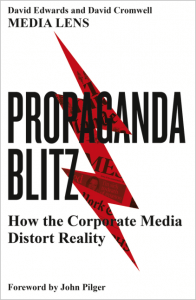
The post
“That Is Actually Bollocks”: 20 Propaganda Horrors From 20 Years of Media Lens (Part 1) first appeared on
Dissident Voice.
This post was originally published on Dissident Voice.
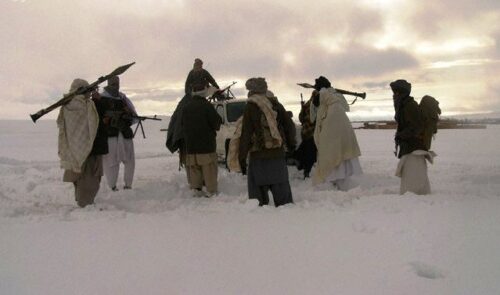
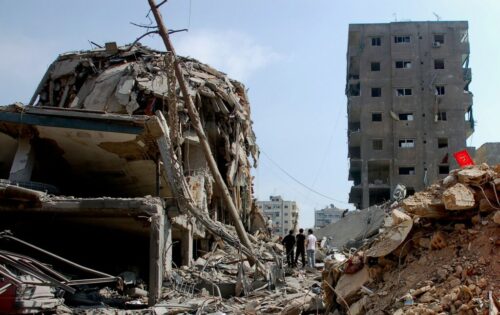



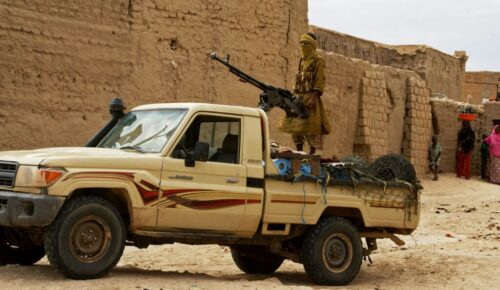
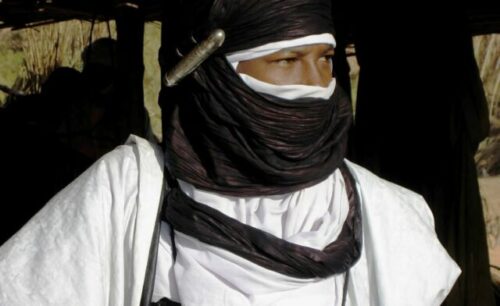
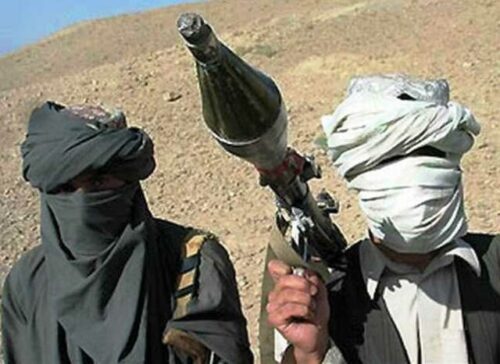
 Photo Credit:
Photo Credit: 



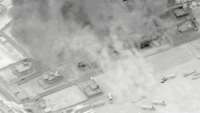


 On April 24, 2021, US President Joseph Biden declared that the massacre of 1.5 million Turkish Armenians in 1915 constituted genocide. As to whether genocide is the word Americans can consent to use about Native Americans who suffered death, torture, displacement, apartheid and disease at the hands, mainly, of European settlers in the eighteenth and nineteenth centuries is a lot less clear, although some state governors have gone for it. As for slavery, not until July 2008 did the US House of Representatives apologize for American slavery of blacks and the subsequent discriminatory laws and practices that have continued to marginalize and oppress a population that today constitutes over 47 million or 14% of the US population. 9 States have officially apologized for their involvement in the enslavement of Africans.
On April 24, 2021, US President Joseph Biden declared that the massacre of 1.5 million Turkish Armenians in 1915 constituted genocide. As to whether genocide is the word Americans can consent to use about Native Americans who suffered death, torture, displacement, apartheid and disease at the hands, mainly, of European settlers in the eighteenth and nineteenth centuries is a lot less clear, although some state governors have gone for it. As for slavery, not until July 2008 did the US House of Representatives apologize for American slavery of blacks and the subsequent discriminatory laws and practices that have continued to marginalize and oppress a population that today constitutes over 47 million or 14% of the US population. 9 States have officially apologized for their involvement in the enslavement of Africans.
